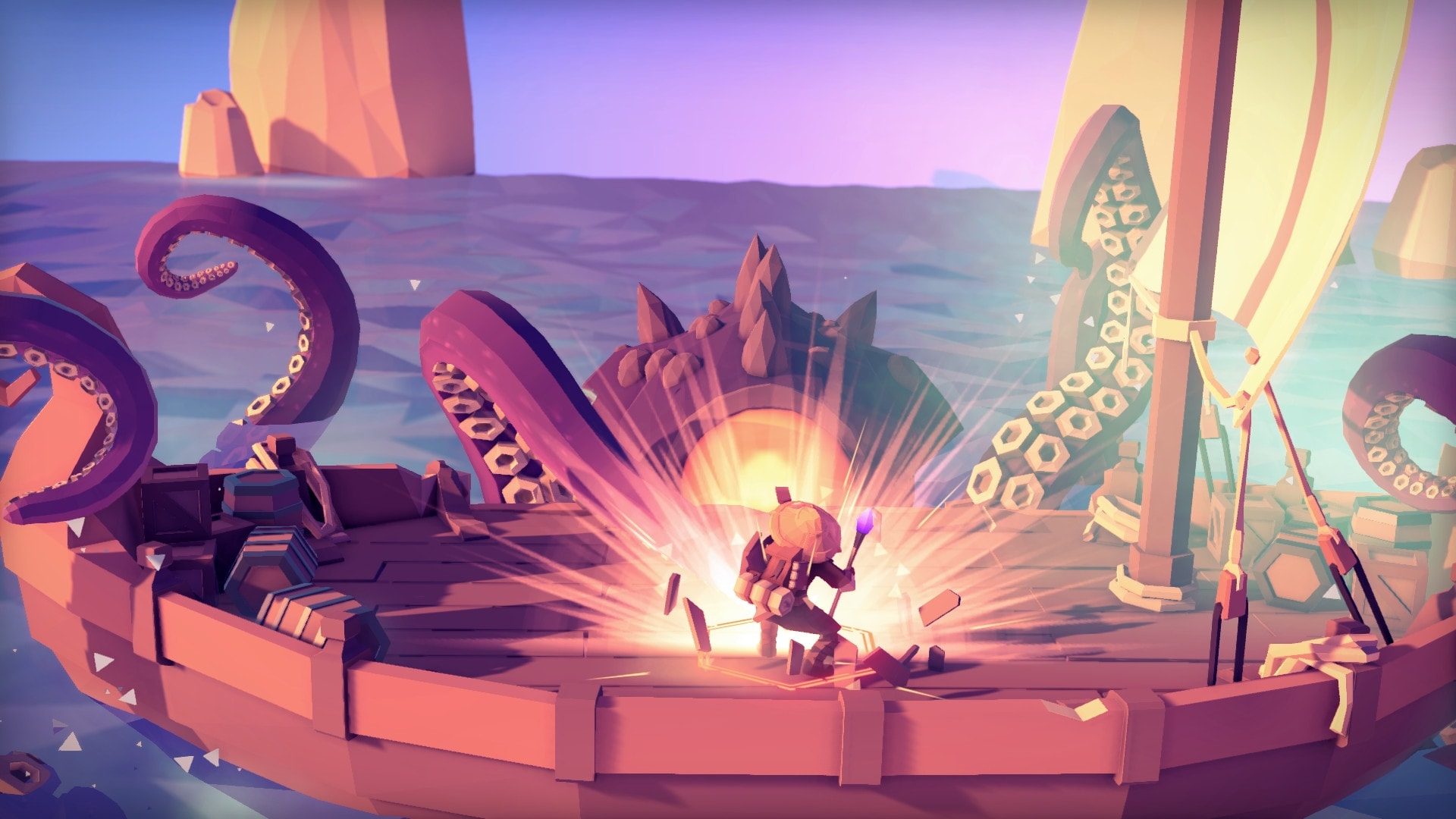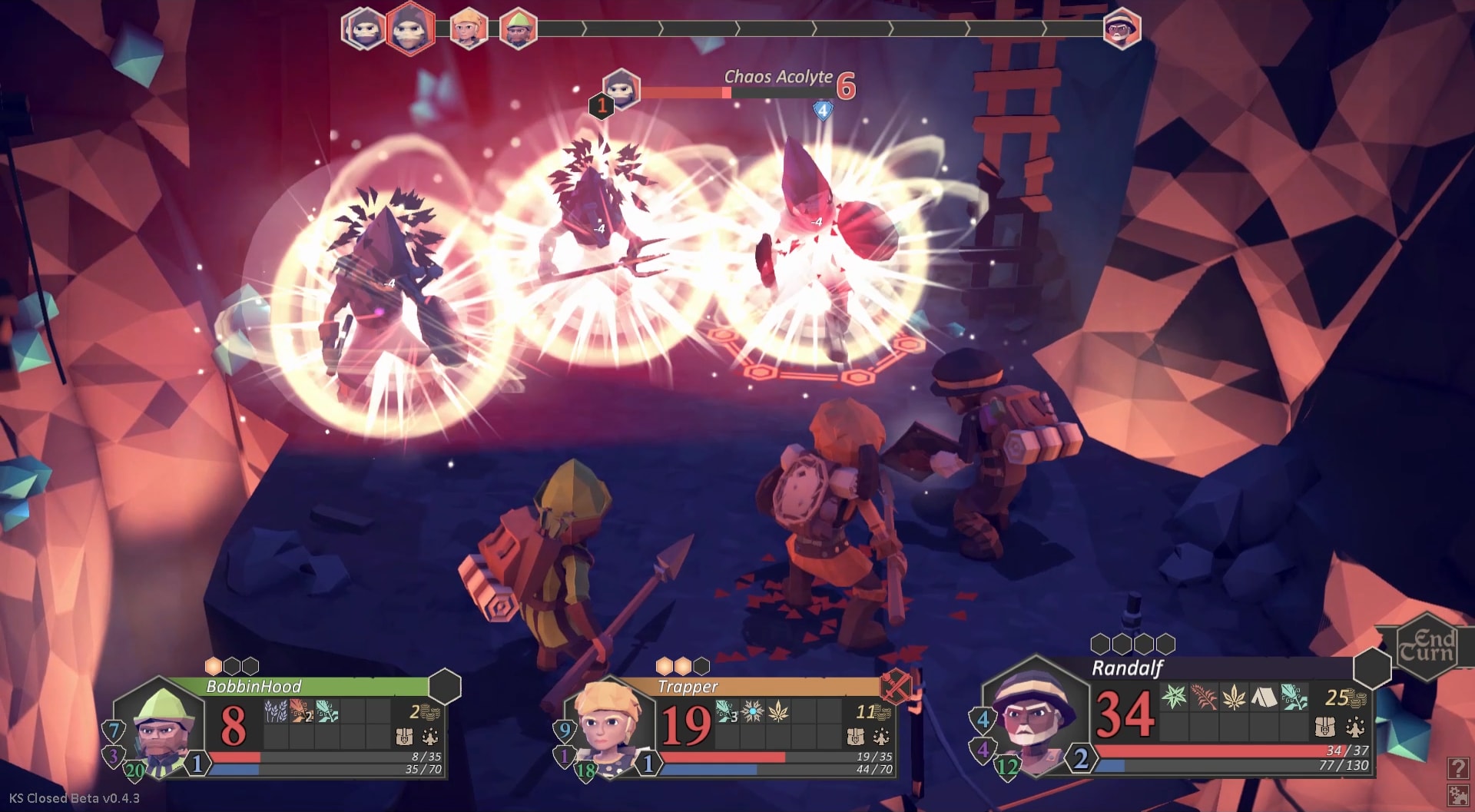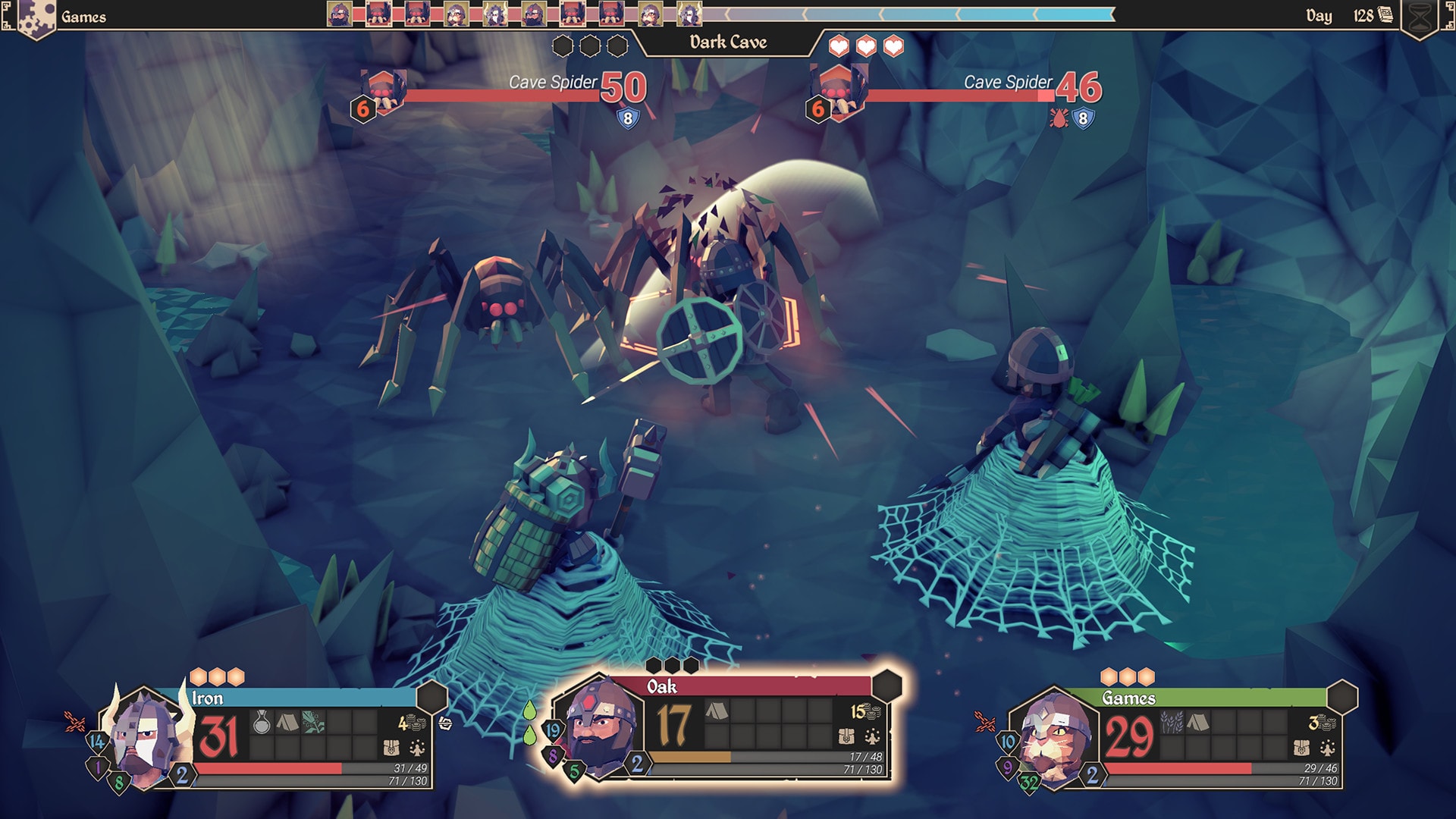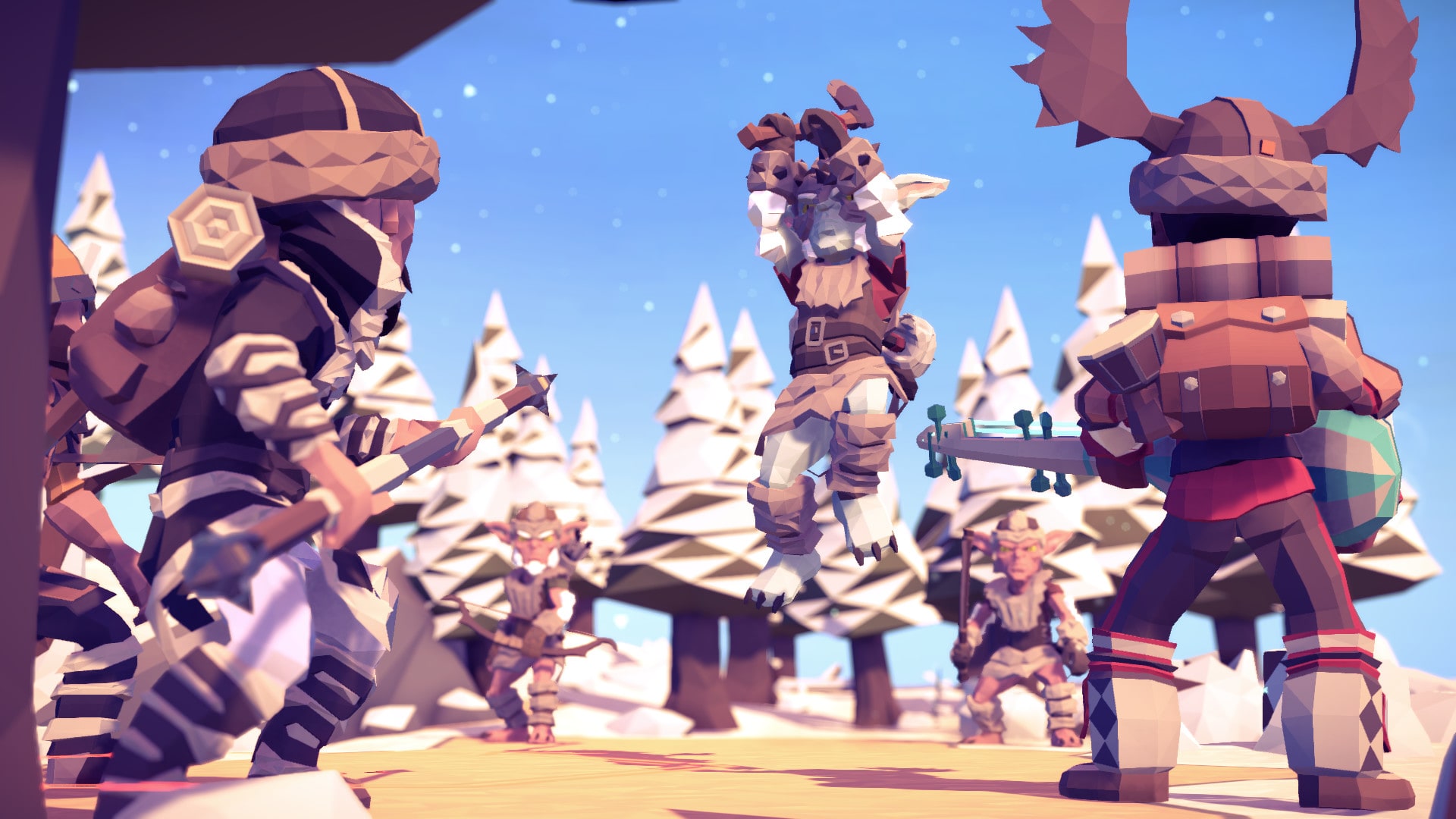“…challenging, mechanically welcoming and aesthetically pleasing.”
For The Kind is a charming hybrid of tabletop role playing and rougelike gaming, created by IronOak Games and Curve Digital. Leaving early access after around a year on the Steam store, the game has drawn in fans from both camps, using a bright and friendly low-poly aesthetic and the promise of an engaging combination of mechanics to attract an enthusiastic flurry of fans from the word go. Add to that the now rare option for local (or online) co-operative multiplayer, and the game’s key features offer an enticing experience to be sure.

So, what is For The King all about? Despite the welcoming appearance of the game, it is certainly no walk in the park. There are three modes of play to choose from at launch, but for the purposes of this review I will focus on the main adventure on offer. Here, the kingdom of Fahrul, where your adventure takes place, is struggling following the loss of its King. Unfortunately, his departure was not a peaceful one either, with an unknown perpetrator still at large and his subjects in a state turmoil. Dark forces threaten the land, observing opportunity amongst the chaos. The Queen, overwhelmed by the seemingly inevitable fall of the Fahrul, has sought help from her people in reviving solidarity. Enter your party of heroes!
On the face of things, the backstory and the world which you are dropped into itself are equal parts generic and appealing. Whilst there is an element of we, the players, having “heard it all before”, the way the game presents itself makes the challenge and mystery promised by the scenario an intriguing and alluring one to entertain. In addition, your party is more noble than that of some other, similar adventure titles. You are citizens of this falling kingdom, with a vested interest in diverting the threats which might seek to overthrow it. In contrast to the more common theme of completing quests for purely material gains, there is some small sense of ownership in For The King which makes it feel that little bit more special from the off.

The aforementioned split between generic and attractive in the game’s story is also reflected in For The King’s gameplay. Many of the mechanics on both the tabletop and rougelike sides of the coin will feel familiar to gamers who are a fan of either genre. Indeed, the strategy elements are not “unique” so to speak either. Once again, though, it is the combination of these individual factors which makes the game feel special. An impressive balance has been struck between the aspects which the developers wanted to include, and the outcome is fun, user-friendly and challenging.
There are two main aspects to gameplay in For The King. The first is an overworld map, set out into hexes, where much of the key decision making and storytelling takes place. Here, you can decide where to send your adventurers, either keeping them together for safety in numbers or dividing the team to cover more ground. These decisions, more often than not, are the ones which can truly make or break your quest in the long run, more so than simple combat mishaps. This is also the viewpoint in which you pick up quests, trade and generally observe and explore the world. Given that each playthrough offers a new, procedurally generated landscape in which your quest will take place, this latter element is often deeply significant.

Movement around the overworld makes use of tabletop mechanics such as rolls for movement, which whilst somewhat unnecessary can be a nice element in mixing up the gameplay. This is especially true in that your heroes act as individuals in For The King, and can potentially find themselves in distinctly different situations. Random quests and events will appear on each unique map generated too, so the element of permadeath does not intrinsically mean playing through the same sequence of story beats in the same way over and over again. As such, should your quest fail, each playthrough of For The King feels relatively fresh, with the exception, of course, of the ultimately finite number of options available within the engine.

Combat in For The King is where tabletop fans will find themselves feeling most at home. Each individual character has their own set of skills, and may carry weapons of varying prowess, but ultimately your chances of a swing or a miss lie in the hands of a dice roll. Equally, the turn-based combat model employed makes your position in the queue another important factor to be aware of, as are the various effects which you and your enemies may imbue on one another. Fortunately, as with most tabletop RPGs, you can influence the outcome of a roll to make it more of a sure thing. This is done through the use of Focus points. Although finite, when correctly used these points can make or break your journey, and they add an extra level of tactics to the game. It is good to know that combat encounters are not purely based on luck, and at the same time that the stakes are always very real. Where a random loot drop might merit you an impressive weapon for your arsenal, a run of poor dice rolls in turn-based combat could still see your adventure come to an abrupt end at any moment.

Outside of either of the particular sides of the game, there are two other features worthy of note; multiplayer and challenge. Multiplayer is a joy in For The King, offering an experience somewhat comparable to a tabletop run whilst offering a pace that in that arena would simply not be possible. The most fun you can have, in fact, in For The King is probably the time spent playing with friends. That is, if they are up to the challenge. Segway into my second point. Challenge in For The King is wildly variable, partially down to the randomness of the world and events. You can find yourself, at times, feeling like the most powerful being in the land, only moments later to fall victim to an event or opponent largely beyond your own skill or control. Random encounters such as those with stray leprechauns, for example, can feel particularly harsh, as your coffers are sucked dry before your very eyes. It is hard for a game like this to offer a fresh, randomised experience and guarantee a fair one every time, too. On balance, the harshness of these events is something which the player must simply learn to accept in return for consistently unpredictable gameplay.

While it doesn’t offer anything strictly new to gamers, the combination of features which form For The King make the game challenging, mechanically welcoming and aesthetically pleasing. Although harsh at times, beyond the control of the player, the game offers in return a consistently fresh experience in the face of impending doom. Most delightfully, it allows you to share this experience with friends, and enjoy your near-inevitable failure together. Decisions are strategic and tough, combat is basic but enjoyable, and on the whole the world is enjoyable to spend time in. Be wary of a few bugs along the way, and be prepared for low-mid levels of saltiness amongst your crew. If you can manage this, then For The King might just be the game for you.








You must be logged in to post a comment.